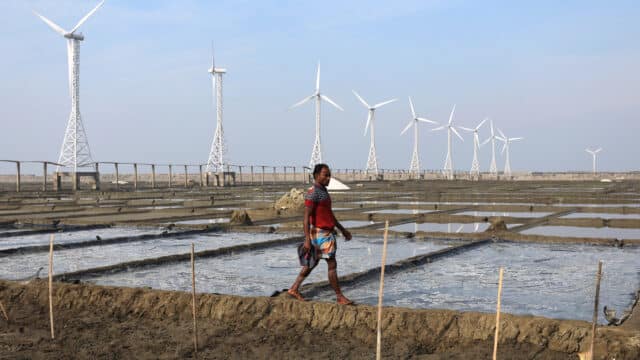Bangladesh’s Predicament Deepens as Asia Braces for Expansion of Fossil Fuel Corporations
06 May 2025 – by Emran Hossain
Bangladesh’s energy sector flags an ominous development in Asia: the arrival of the time with many opportunities for old fossil fuel corporations to expand and new ones to emerge.
Bangladesh’s economy, hit hard by mindless fossil fuel expansion, mainly based on imports, faces the risk of being even more exposed to fossil fuel use despite its struggle to sustain one of the world’s largest populations, with over 171 million people, amid staggering inflation, depleting dollar reserves, and soaring energy prices.
Recent energy sector developments in the South Asian nation, including new energy deals and plans made by its newly formed interim government, correspond well to a frightening turn of events in Asia. Some of its biggest economies, such as Japan and India, are scrambling for deals with the USA under the leadership of its newly elected president, Donald Trump, to scale up fossil fuel trades like never before.
For a while now, Bangladesh has been under the Western media spotlight for the political shift promising to end the domination of traditional dynastic politics, which often spawned authoritarian rules, the latest one ending in August last year by a student-led mass uprising. The political change brought to power the interim government, comprising a group of civil society members boasting Western degrees and the experience of leading development works, often collaborating with institutions such as the World Bank, International Monetary Fund, and the like.
Interim Government’s Controversial Steps
After promising major reforms, Bangladesh’s interim government is now actively weighing the option of open-pit coal mining in the land-scarce, densely populated riverine landscape. This comes immediately after striking a non-binding deal with the USA to import liquefied natural gas that energy experts said would in no way help improve the country’s poor energy security status.
While carrying on fossil fuel projects initiated during the rule of the past authoritarian government, the incumbents, led by Nobel laureate Muhammad Yunus, scrapped scores of renewable energy projects on the ground that they were taken sans bidding. Tenders for new renewable projects feature eligibility criteria experts say are hard to fulfil in Bangladesh’s current reality. Despite repeated extensions, tenders failed to attract any response. The scope of renewable energy expansion has been limited in the country’s draft renewable energy policy released in early February this year with plans until 2041.
“We are surprised by the steps taken by the chief adviser, Professor Muhammad Yunus, globally known for his theory of three zeros, including zero-emission,” said Khondaker Golam Moazzem, research director, Centre for Policy Dialogue, a non-government think tank. “Decarbonisation is important in making economies sustainable,” he noted.
Bangladesh’s Economic and Energy Security Status
The ousted authoritarian regime of former premier Sheikh Hasina spent $33 billion in the power sector alone during its 15-year tenure, scaling up the installed power generation capacity to 23,156MW in July 2024 from only 4,942MW in 2009.
Despite spending close to $2 billion annually on energy imports, Bangladesh cannot ensure a sufficient supply of electricity and gas, leaving its industries, especially the readymade garment industry, the lifeline of the economy, and its population in perpetual energy poverty despite rising energy expenses.
Bangladesh’s unpaid energy bills to power plants stood at Tk 38,373 crore in January despite using only half its installed power generation capacity.
The unused energy capacity remained a huge burden, generating massive amounts of capacity charges every month and necessitating the payment of massive subsidies. In the current year, energy subsidy is set to exceed Tk 41,000 crore, up from Tk 35,000 crore last year, with the current energy supply unlikely to improve. Capacity charge accounts for over 37% of the overall power production cost—Tk 11.55 per unit. Over the past decade, the ever-increasing energy generation cost has substantially increased production costs, leaving industries sick and forcing many to close down.
According to an analysis by the Bangladesh Power Development Board, an idle gas—and liquid-fuel-based power plant charges $10-$12 per kw per month in capacity payment, whereas a coal-fired power plant takes $20-$25 kw per month.
If there is an overcapacity of 1,000MW of gas or liquid fuel power plant, BPDB’s capacity payment expenses rise by $120-$144 million per year. For a similar size of coal overcapacity, the BPDB’s similar cost rises by $240-$300 million.
Despite fossil fuel projects carrying such financial ramifications, the interim government continued building 4,089MW of new capacity based on coal and LNG by 2030.
Renewable Energy Projects and Draft Renewable Energy Policy
The cancelled 31 renewable energy projects had a combined capacity of 2,600MW. Some foreign investors, Marubeni Corporation and Total Gas, who were just a step behind signing the power purchase agreement, went back home, frustrated after spending millions navigating corrupt politicians and bureaucracy. Only four renewable energy projects are currently under construction, scheduled to come online this year, with a capacity of about 100MW.
Bangladesh’s current installed power generation capacity is 27,535MW. Renewable energy accounts for 992MW of the capacity.In the draft update of the renewable energy policy, originally formulated in 2008, an ambitious goal of increasing the renewable energy capacity to 6,145MW over the next five years has been set.
Bangladesh has never achieved its renewable energy targets, such as those set in the original 2008 policy, power sector master plans, five-year plans, and the Mujib Climate Prosperity Plan, in the last 17 years. The draft update of the renewable energy policy even lacks a decarbonisation roadmap, green taxonomy, and a plan to mobilise funds, leading energy experts to label it greenwashing.
Open-Pit Coal Mining on The Card
In a show of its desperation to facilitate fossil fuel expansion, the interim government revived a controversy settled almost two decades ago with the sacrifice of three lives in a rare protest against open-pit coal mining in Phulbari of Dinajpur, a northern Bangladesh district.
Ignoring the 2006 agreement that the then government had signed to oppose open-pit coal mining, the interim government recently hosted a discussion on the mining’s potential benefits. The open-pit coal mining involves the UK-based Asia Energy, which changed its name to Global Coal Management after facing the Phulbari resistance.
In February 2012, concerned by a move by the past Awami League government in favour of open-pit coal mining at Phulbari, a group of experts from the United Nations noted that the move would displace an estimated 50,000–1,30,000 people and affect 2,20,000 others by drying up wells. The UN experts noted that the project would destroy some 12,000 hectares of productive agricultural land, waterways supporting 1,000 fisheries, and nearly 50,000 fruit trees.
In the controversial Integrated Energy and Power Master Plan, prepared by the Japan International Cooperation Agency, the previous government emphasised extracting domestic coal to ensure energy security, sourcing 30% of power from coal in 2031 and 35% in 2041.
Gloomy Gas Sector Developments
The interim government also signed an LNG import deal with Louisiana-based Argent LNG, a rather unreliable newcomer in the business. This was apparently to please US President Donald Trump, who is desperate to get business deals, especially energy deals.
The US-based Institute for Energy Economics and Financial Analysis said that the deal would mainly benefit the American company and expose Bangladesh to even more external shocks, including price volatility and increased transportation costs.
LNG as a source of energy proved unreliable during the past regime, with Bangladesh descending into its current crisis within years of starting LNG import through long-term contracts and spot market purchases. Bangladesh spent Tk 1,730 billion ($13.84 billion) on LNG imports until September last year since 2018.
Since the LNG import started, consumers have experienced frequent price hikes, with household consumers seeing their energy bill inflate by as high as 35%, hotels and restaurants by 79%, and industries by about 200% so far.
About half of the current LNG import infrastructure—two floating storage and regasification units with a combined capacity of 1,100mmcfd—often remains unused because of inclement weather. The FSRUs are also entitled to a whopping capacity charge.
Asian Nations Welcome Fossil Fuel Expansion
During his two-day visit to the USA in mid-February, Indian Prime Minister Narendra Modi said that his country would focus on trade in oil and gas from the USA to ensure India’s energy security.
The same month, Japanese Prime Minister Shigeru Ishiba visited the USA and agreed to higher LNG imports from the country. Japan’s promise bears substantial significance for South Asian and Southeast Asian countries, where Japan has been securing markets for future LNG supply by influencing energy policies.
On its website, Argent LNG discusses its ambitious plans to supply fuel to power generation assets across Japan, Southeast Asia, Europe, South America, the Caribbean, the Middle East and North Africa. At its peak operation, the company plans to export 25 million tonnes per annum. On the other hand, the Alaska LNG project involves 20 million tons per year, supplying gas from Alaska’s remote north via a $44 billion 1,300-km (800-mile) pipeline and shipping the fuel to Japan, South Korea and Taiwan.
by Emran Hossain
Emran Hossain is a journalist based in Dhaka, Bangladesh, with twenty years of experience reporting on issues related to human rights, the environment, the energy sector and ethnic and religious minorities. He was conferred the 2013 Daniel Peral Fellowship for promoting mutual respect and understanding among diverse cultures through journalism.
Read more







